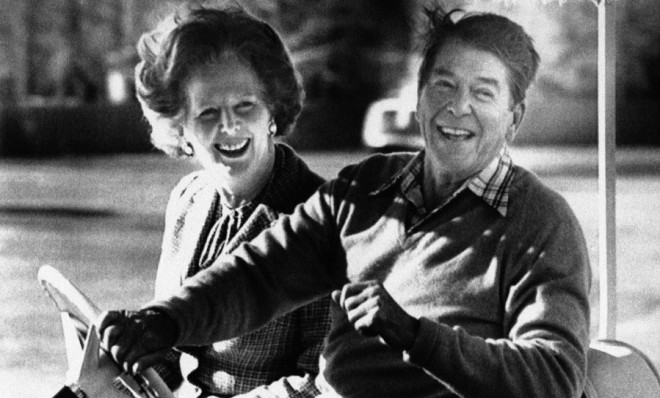Thatcher and Reagan: A look back at one of the world's most powerful political alliances
The Gipper and the Iron Lady shared a relationship for the ages

In almost every obituary about Margaret Thatcher, the former prime minister of Great Britain who died Monday morning of a stroke, you'll find a reference to her close friend and political ally Ronald Reagan. What made their relationship so special?
As Margaret Thatcher herself once pointed out in the National Review, "[t]here have not been many times when a British prime minister has been prime minister through two consecutive terms of office of the same president of the United States." To find the others, you have to go back to the times of George Washington and James Monroe.
Reagan and Thatcher both entered office during a time, as she phrased it, of "high interest rates, high inflation, sluggish growth, and a growing demand for self-destructive protectionism." That set the stage for one of the most impressive political shifts in American or British history, says Michael Tomasky at The Daily Beast:
The Week
Escape your echo chamber. Get the facts behind the news, plus analysis from multiple perspectives.

Sign up for The Week's Free Newsletters
From our morning news briefing to a weekly Good News Newsletter, get the best of The Week delivered directly to your inbox.
From our morning news briefing to a weekly Good News Newsletter, get the best of The Week delivered directly to your inbox.
It was indeed a very lucky thing for conservatism in both nations that at the exact point in both nations' histories when the general public was ready to break with liberalism, the conservative parties just so happened to offer leaders whose personalities were large and strong and appealing to many people and were very nicely in tune with the times in both countries. Reagan had that American optimism, Thatcher was a bit more somber. But they were more similar than different. [Daily Beast]
In the public eye, they were the rare politicians who not only shared ideals, but also what seemed like a genuinely warm relationship. She famously once called him "the second most important man in my life." Reagan called her "the best man in England."
They more than liked each other, George Shultz, President Reagan's secretary of state, writes at The Daily Beast. They were "ideological soulmates," not because "she was pro-American or that the president was pro-British," but because "they saw the world in similar ways, [particularly] the Cold War and the vitality of Western economies."
Their respective ideologies became so influential that they earned their own names: Thatcherism and Reaganomics, both, as Gregory Katz and Robert Barr of the AP note, "motivated by an unshakable belief that free markets would build a better country than reliance on a strong, central government."
Not that the Gipper and the Iron Lady always got along. In 1982, Reagan urged her not to strike back against Argentine troops that had invaded the Falkland Islands. According to The New York Times, Thatcher rejected Reagan's appeals for talks three times, lamenting that the U.K. had been forced to "act alone, with no outside help."
A free daily email with the biggest news stories of the day – and the best features from TheWeek.com
Mostly, however, they saw eye-to-eye on foreign policy matters. She even gave a speech before a joint session of Congress in 1985 promoting Reagan's policies, including, according to The Washington Post, his controversial "Star Wars" missile defense plan.
Today, Republicans are as fond of the pair as ever. "Americans will always keep Lady Thatcher in our hearts for her loyalty to Ronald Reagan and their friendship that we all admired," House Speaker John Boehner said in a statement, according to Politico. She also received effusive praise from Marco Rubio, Mitch McConnell, Pat Toomey, Newt Gingrich and others — almost all of them mentioning her alongside Reagan. Thatcher, who gave a eulogy for Reagan after his death in 2004, would almost certainly not mind she and "Ronnie" being tied together in the eyes of history.
-
 Grok in the crosshairs as EU launches deepfake porn probe
Grok in the crosshairs as EU launches deepfake porn probeIN THE SPOTLIGHT The European Union has officially begun investigating Elon Musk’s proprietary AI, as regulators zero in on Grok’s porn problem and its impact continent-wide
-
 ‘But being a “hot” country does not make you a good country’
‘But being a “hot” country does not make you a good country’Instant Opinion Opinion, comment and editorials of the day
-
 Why have homicide rates reportedly plummeted in the last year?
Why have homicide rates reportedly plummeted in the last year?Today’s Big Question There could be more to the story than politics